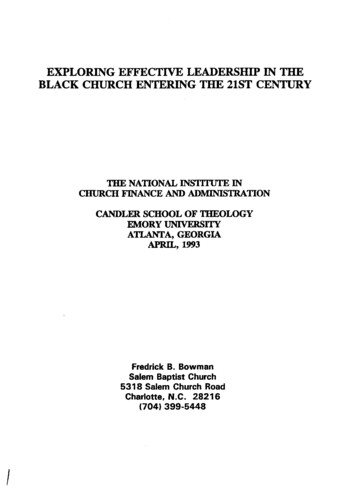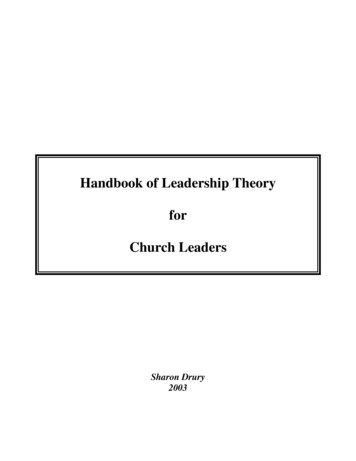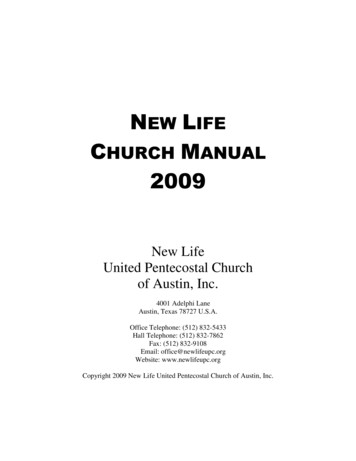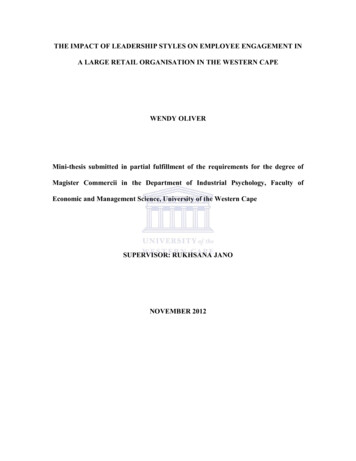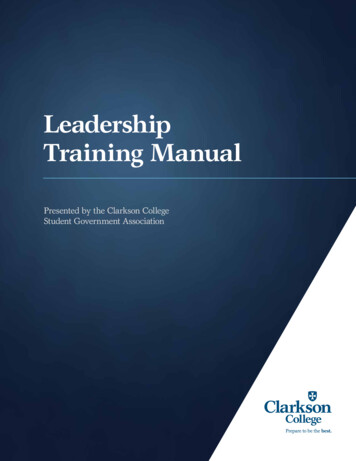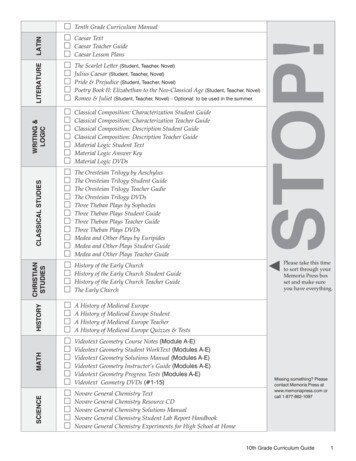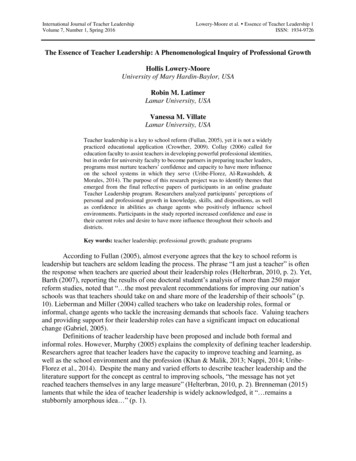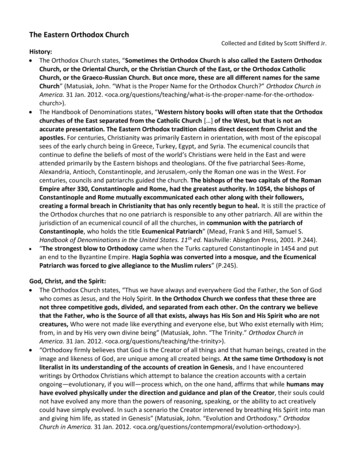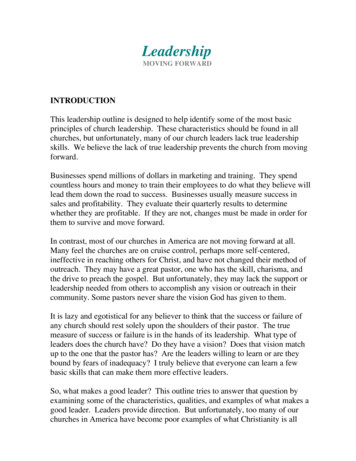
Transcription
LeadershipBill ScheidlerTeacher’s Manual
LeadershipContentsLesson 1-4 – Introduction to Leadership .4-15Lesson 5 – The Need for Leadership 16-23Lesson 6 –Leadership Concepts 24-26Lesson 7 – Jesus’ Model of Leadership 27-35Lesson 8-11 – Servant Leadership 36-62Lesson 12-14 – The Call to Leadership 63-82Lesson 15 – The Heart of a Leader .83-90Lesson 16-18 – The Preparation of a Leader .91-110Lesson 19-20 – The Character of a Leader .111-131Lesson 21 – The Competencies of a Leader .132-138Lesson 22-23 – The Pitfalls of Leadership 139-153Lesson 24 – Grace to Lead .154-160Leadership Bill Scheidler, 2009Teacher’s Manual2
Recommended Reading on LeadershipBuilding Leaders: Blueprints for Developing Leadership at Every Level of YourChurch, Aubrey MalphursBeing Leaders: The Nature of Authentic Christian Leadership, Aubrey MalphursCourageous Leadership, Bill HybelsDeveloping the Leader within You, John MaxwellGood to Great, Jim CollinsIn Search of Excellence, Thomas J. Peters and Robert H. WatermanLeaders on Leadership, George BarnaSpiritual Leadership, Henry & Richard BlackabyThe 21 Indispensible Qualities of a Leader, John MaxwellThe 21 Irrefutable Laws of Leadership, John MaxwellThe 360 Degree Leader, John MaxwellThe Dream Manager, Matthew KellyThe Making of a Leader, Frank DamazioThe Making of a Leader, Dr. J. Robert ClintonLeadership Bill Scheidler, 2009Teacher’s Manual3
Lesson 1-4Introduction to LeadershipI.What is said by others about leadership?Notable Quotes:A. Leadership is Example“The best example of leadership is leadership by example.” –Jerry McClain“Setting an example is not the main means of influencing others, it is the onlymeans.” –Albert Einstein“The difference between a boss and a leader is that a boss says, ‘Go!’ while aleader says, ‘Let’s go!’” –E. M. Kelly“Nothing so conclusively proves a man’s ability to lead others as what he doesfrom day to day to lead himself.” –Thomas J. Watson“A leader is one who knows the way, goes the way, and shows the way.”–John MaxwellB. Leadership is Character“Managers are people who do things right, while leaders are people who do theright thing.” –Warren Bennis, Ph.D.“The greater a man is in power above others, the more he ought to excel them invirtue. None ought to govern who is not better than the governed.” –Publius SyrusC. Leadership is Influence“Leadership is influence—nothing more, nothing less.” –John C. Maxwell“A leader is one who influences a specific group of people to move in a Godgiven direction.” –J. Robert Clinton“The only test of leadership is that somebody follows.” –Robert K. Greenleaf“Leaders don’t force people to follow; they invite them on a journey.”–Charles S. Lauer“Leadership is the desire and ability to inspire individual achievement, while aleader is just a guy at the top of the heap worried about his own.” –Keith Mullen“Leadership is the art of getting someone else to do something you want donebecause he wants to do it.” –Dwight D. EisenhowerLeadership Bill Scheidler, 2009Teacher’s Manual4
“If your actions inspire others to dream more, learn more, do more and becomemore, you are a leader.” –John Quincy Adams“Leadership is the ability of a single individual through his or her actions tomotivate others to higher levels of achievement.” –F. G. “Buck” RodgersD. Leadership is Serving“The first step to leadership is servanthood.” –John Maxwell.“He who has learned how to obey will know how to command.” –Solon“You cannot be a leader, and ask other people to follow you, unless you knowhow to follow, too.” –Sam Rayburn“Be gentle and you can be bold; be frugal and you can be liberal; avoid puttingyourself before others and you can become a leader among men.” –Lao Tzu“The first responsibility of a leader is to define reality. The last is to say, ‘Thankyou.’ In between, the leader is a servant.” –Max De PreeE. Leadership is Lifting Others“Blessed is the leader who seeks the best for those he serves.” –Unknown“Outstanding leaders go out of their way to boost the self-esteem of theirpersonnel. If people believe in themselves, it’s amazing what they canaccomplish.” –Sam Walton“Leadership is getting someone to do what they don’t want to do in order toachieve what they want to achieve.” –Tom Landry“A good leader inspires others with confidence in him; a great leader inspiresthem with confidence in themselves.” –Unknown“Leadership must be based on goodwill. Goodwill does not mean posturing and,least of all, pandering to the mob. It means obvious and wholeheartedcommitment to helping followers. We are tired of leaders we fear, tired of leaderswe love, and of tired of leaders who let us take liberties with them. What we needfor leaders are men of the heart who are so helpful that they, in effect, do awaywith the need of their jobs. But leaders like that are never out of a job, never out offollowers. Strange as it sounds, great leaders gain authority by giving it away.”–Admiral James B. StockdaleF. Leadership is Vision“Leadership is not magnetic personality — that can just as well be a glib tongue. Itis not making friends and influencing people — that is flattery. Leadership islifting a person’s vision to high sights, the raising of a person’s performance to aLeadership Bill Scheidler, 2009Teacher’s Manual5
higher standard, the building of a personality beyond its normal limitations.”–Peter F. Drucker“Leadership is the special quality which enables people to stand up and pull therest of us over the horizon.” –James L. Fisher.“The first basic ingredient of leadership is a guiding vision. The leader has a clearidea of what he wants to do – professionally and personally – and the strength topersist in the face of setbacks, even failures.” –Warren Bennis“The very essence of leadership is that you have to have a vision. It’s got to be avision you articulate clearly and forcefully on every occasion.”–Theodore Hesburgh“Leadership: Seeing further down the road than those around me.” –Bill GothardG. Leadership is Daring“Do not follow where the path may lead. Go instead where there is no path andleave a trail.” –Emerson“The task of the leader is to get his people from where they are to where they havenot been.” –Henry Kissinger“There are many elements to a campaign. Leadership is number one. Everythingelse is number two.” –Bernd BrecherH. Leadership is Courage under Pressure“All of the great leaders have had one characteristic in common: it was thewillingness to confront unequivocally the major anxiety of their people in theirtime. This, and not much else, is the essence of leadership.”–John Kenneth Galbraith“Anyone can hold the helm when the sea is calm.” –Publilius Syrus“The ultimate measure of a man is not where he stands in moments of comfort,but where he stands at times of challenge and controversy.”–Martin Luther King, Jr.“Leadership is the ability to hide your panic from others.” –Unknown“Leaders must be tough enough to fight, tender enough to cry, human enough tomake mistakes, humble enough to admit them, strong enough to absorb the pain,and resilient enough to bounce back and keep on moving.” –Jesse JacksonI. Leadership is Discipleship“The final test of a leader is that he leaves behind him in other men the convictionand the will to carry on.” –Walter LippmannLeadership Bill Scheidler, 2009Teacher’s Manual6
“How do you know you have won? When the energy is coming the other way andwhen your people are visibly growing individually and as a group.”–Sir John Harvey-Jones“Leadership is the ability to establish standards and manage a creative climatewhere people are self-motivated toward the mastery of long term constructivegoals, in a participatory environment of mutual respect, compatible with personalvalues.” –Mike Vance“I start with the premise that the function of leadership is to produce more leaders,not more followers.” –Ralph NaderJ. Other Leadership Quotes“Great leaders are almost always great simplifiers, who can cut through argument,debate, and doubt to offer a solution everybody can understand.”–General Colin Powell“No man will make a great leader who wants to do it all himself or to get all thecredit for doing it.” –Andrew CarnegieThe challenge of leadership is to be strong, but not rude; to be kind, but not weak; to be bold, but not bully; to be thoughtful, but not lazy; to be humble, but not timid; to be proud, but not arrogant; to have humor, but without folly.–Jim RohnII.What is the definition of “leadership”?A. There are many definitions that have been given to the concept of “leadership.”The following are just a few of them:1. From WikipediaLeadership has been described as the “process of social influence in which oneperson can enlist the aid and support of others in the accomplishment of acommon task.”A definition more inclusive of followers comes from Alan Keith of Genentechwho said “Leadership is ultimately about creating a way for people tocontribute to making something extraordinary happen.”2. From BusinessDictionary.comLeadership Bill Scheidler, 2009Teacher’s Manual7
“In its essence, leadership in an organizational role involves (1) establishing aclear vision, (2) sharing (communicating) that vision with others so that theywill follow willingly, (3) providing the information, knowledge, and methodsto realize that vision, and (4) coordinating and balancing the conflictinginterests of all members or stakeholders.”3. From BNET Business Dictionary“Leadership is the capacity to establish direction and to influence and alignothers toward a common goal, motivating and committing them to action andmaking them responsible for their performance.”4. From Answers.Com“Leadership is a process in which a leader attempts to influence his or herfollowers to establish and accomplish a goal or goals. In order to accomplishthe goal, the leader exercises his or her power to influence people. That poweris exercised in earlier stages by motivating followers to get the job done and inlater stages by rewarding or punishing those who do or do not perform to thelevel of expectation. Leadership is a continuous process, with theaccomplishment of one goal becoming the beginning of a new goal. Theproper reward by the leader is of utmost importance in order to continuallymotivate followers in the process.5. Others“The new leader . is one who commits people to action, who convertsfollowers into leaders, and who may convert leaders into agents of change.”–Warren Bennis“. persons who, by word and/or personal example, markedly influence thebehaviors, thoughts and feelings of a significant number of their fellow humanbeings.” –Howard GardnerB. Most of the definitions of “leadership” have certain common elements to them.1. Leadership involves establishing direction, vision and purpose.2. Leadership involves exciting others with regard to that vision and purpose.3. Leadership involves motivating others to join with that vision and purpose.4. Leadership involves equipping others to succeed in that vision and purpose.5. Leadership involves rewarding those who contribute to the vision and purpose.6. Leadership involves raising other leaders with a sense of vision and purpose.7. Leadership involves releasing other leaders to fulfill their vision and purpose.Leadership Bill Scheidler, 2009Teacher’s Manual8
III.What is the biblical definition of “leadership”?A. There are several key passages in the Old Testament that lay a foundation forbuilding a biblical definition of leadership.1. Exodus 18:13-23 – Jethro’s Counsel to MosesThe key things from this passage that fill out our understanding of biblicalleadership include:a. Biblical leaders will experience a call that demands the involvement ofothers to fulfill.b. Biblical leaders must focus on training leaders in two key areas includingthe way to walk and the work to do.c. Biblical leaders must be able to select others in whom to invest their heartand vision.d. Biblical leaders fulfill their call by delegating to and managing others.e. Biblical leaders release others to do the work without jealousy.f. Biblical leaders only do what their delegates cannot do.2. Deuteronomy 17:14-20 – The Law of the KingsThe key things from this passage that fill out our understanding of biblicalleadership include:a. Biblical leaders must be chosen by God Himself.b. Biblical leaders must not use their position for self-gratification.c. Biblical leaders must submit to the laws of God.d. Biblical leaders must be humble before God and the people they serve.3. Psalm 23:1-6 – The Good ShepherdThe key things from this passage that fill out our understanding of biblicalleadership include:a. Biblical leaders are concerned about the needs of those that they lead.b. Biblical leaders seek to lift rather than suppress those that they serve.The Good Shepherd provides, gives rest, confidently leads, renews, restores,guides, directs, protects, corrects, comforts, feeds, anoints, loves and furnishespermanent shelter.Leadership Bill Scheidler, 2009Teacher’s Manual9
B. There are several key passages in the New Testament that lay a foundation forbuilding a biblical definition of leadership.1. Mark 10:35-45 (See also: Mt. 20:20-28; Luke 22:24-27) – The GreatestThe key things from this passage that fill out our understanding of biblicalleadership include:a. Biblical leaders are not position and authority minded seeking to be servedby others.b. Biblical leaders are servants-minded and understand that they have theirposition for the purpose of serving others.2. John 10:11-18 – The Good ShepherdThe key things from this passage that fill out our understanding of biblicalleadership include:a. Biblical leaders live for the sake of others.b. Biblical leaders protect their followers from danger.c. Biblical leaders care about individuals.3. John 13:1-15 – Washing the Feet of DisciplesThe key things from this passage that fill out our understanding of biblicalleadership include:a. Biblical leaders understand their call and position before God.b. Biblical leaders are secure enough before the Lord to be able to participatein tasks at all levels.c. Biblical leaders provide an example to others of what it means to humblyserve.4. Acts 20:17-38 – Tending the FlockThe key things from this passage that fill out our understanding of biblicalleadership include:a. Biblical leaders live a life of example that is open to all (vs. 18).b. Biblical leaders serve the Lord with humility (vs. 19).c. Biblical leaders do not keep back anything that will help those they serve(vs. 20, 27).Leadership Bill Scheidler, 2009Teacher’s Manual10
d. Biblical leaders take every opportunity to instruct their followers (vs. 20).e. Biblical leaders are driven by a sense of purpose and destiny (vs. 22-24).f. Biblical leaders are able to face the challenge of opposition to their calling(vs. 19, 23).g. Biblical leaders live a life that is ethically clean (vs. 26).The word “innocent” that is used in this passage literally means “clean,genuine and free from corrupt desire, guilt or sin.”h. Biblical leaders prepare their followers for potential danger (vs. 29-31).i. Biblical leaders know how to commend their followers to God (vs. 32).j. Biblical leaders are not greedy but generous to those under their influence(vs. 33-35).5. Romans 12:3-8 – Grace, Gifts and MinistriesThe key things from this passage that fill out our understanding of biblicalleadership include:a. Biblical leaders function in the context of their grace level.b. Biblical leaders function according to their measure of faith.c. Biblical leaders maximize the ministry gifts that have been given to them.d. Biblical leaders are diligent in their pursuits.6. I Corinthians 12:12-31 – The Body of Christ Functioning TogetherThe key things from this passage that fill out our understanding of biblicalleadership include:a. Biblical leaders recognize that they are a part of something that is biggerthan themselves.b. Biblical leaders acknowledge that their gifts and ministries are theirs byGod’s choosing and not their own merit.c. Biblical leaders understand that they are part of a team and that it takesmore than one person to accomplish God’s purpose.d. Biblical leaders understand the need for diversity in team members.Leadership Bill Scheidler, 2009Teacher’s Manual11
e. Biblical leaders acknowledge that every person is vital and must be givendue respect regardless of their specific role.f. Biblical leaders realize that sometimes followers who seem to be lessimportant are actually more important.g. Biblical leaders treat everyone with equal pastoral concern and care.7. Ephesians 4:7-16 – The Five-fold MinistryThe key things from this passage that fill out our understanding of biblicalleadership include:a. Biblical leaders recognize the specific calling on their lives.b. Biblical leaders realize that they are Christ’s gift to His people.c. Biblical leaders acknowledge that since they have been given to another,they do not belong to themselves and cannot live for themselves.d. Biblical leaders understand that they exist for the purpose of equipping andbuilding up others.8. Philippians 2:1-11 – The Humility of ChristThe key things from this passage that fill out our understanding of biblicalleadership include:a. Biblical leaders do not lead out of selfish ambition or conceit.b. Biblical leaders do not see themselves as better than others but they treatothers as better than themselves.c. Biblical leaders genuinely care about the interests of their followers.d. Biblical leaders humble themselves to raise others up.e. Biblical leaders look to God to raise them up.9. I Thessalonians 2:1-12 – The Spirit of a LeaderThe key things from this passage that fill out our understanding of biblicalleadership include:a. Biblical leaders are able to move forward with courage and boldness in theface of great opposition (vs. 2).We had previously suffered and been insulted in Philippi, as you know, butwith the help of our God we dared to tell you his gospel in spite of strongopposition. I Thessalonians 2:2, NIVLeadership Bill Scheidler, 2009Teacher’s Manual12
You know how badly we had been treated at Philippi just before we cameto you and how much we suffered there. Yet our God gave us the courageto declare his Good News to you boldly, even though we were surroundedby many who opposed us. –NLTb. Biblical leaders do not function out of wrong motives (vs. 3-6).This means that they do not function From error.This word means “fraudulence.” Paul is saying that we did notminister with hidden motives. It means that we were what we said thatwe were. We were genuine and sincere. From uncleanness.This word speaks of impurity as it relates to living and lifestyle. Paulis saying that we did not minister in a lustful or immoral way seekingonly self-gratification. From deceit.This word means craft, deceit or guile. It means that we were nottrying to cunningly manipulate you for selfish purposes by our use ofwords. From the desire to please men.Paul is saying that our motives were not to please men, but to pleaseGod who is the one we were representing to you. From covetousness.Paul is saying that we did not use flattering words or language with themotive of extorting money from you. We did not minister to you insuch a way that you would feel so good that you would be happy togive us your money. From a desire for personal glory.The word “glory” means praise and honor. Paul is saying that whenwe ministered to you it was not with the goal of getting personal praiseout of it.c. Biblical leaders function out of a correct spirit (vs. 7-8).This means that they function Leadership Bill Scheidler, 2009Teacher’s Manual13
With gentleness.With affection.With dedication and commitment.With diligence.With devoutness.With justice.d. Biblical leaders are not demanding or a burden to their followers, they area blessing (vs. 6, 9).e. Biblical leaders cherish their followers as a nursing mother cherishes herchildren.f. Biblical leaders exhort, charge and comfort their followers as a father doeshis own children.10. I Timothy 3:1-7 and Titus 1:5-9 – The Qualifications of LeadersThe key things from these passages that fill out our understanding of biblicalleadership include:a. Biblical leaders must be spiritually qualified as mature believers.b. Biblical leaders must depend on the word of God for guidance.c. Biblical leaders must be balanced in their personal, family and corporatelife.d. Biblical leaders must be gifted to lead.11. I Peter 5:1-5 – The Pastoral ChargeThe key things from this passage that fill out our understanding of biblicalleadership include:a. Biblical leaders embrace their role as leaders cheerfully and willingly.b. Biblical leaders do not see money as the main reward of leadership.c. Biblical leaders serve as examples to people rather than as lords overpeople.d. Biblical leaders recognize that their followers are a stewardship from Godand do not belong to them.e. Biblical leaders understand that the reward for leading God’s way is notmerely temporal but extends into eternity.C. There are several good definitions of leadership from a biblical perspective.Leadership Bill Scheidler, 2009Teacher’s Manual14
There are several good definitions of leadership from a biblical perspective.“I define a leader as a godly servant (character) who knows and sees where he orshe is going (mission and vision) and has followers (influence).”–Aubrey MalphursPerhaps the definition I like the most is from Dr. J. Robert Clinton in his bookThe Making of a Leader. He defines biblical leadership this way:“Leadership is a dynamic process in which a man or woman with God-givencapacity and God-given responsibility influences a specific group of God’s peopletoward God’s purpose for that group.”This definition has several parts to it.1. The responsibility of the leader is tied to the eternal purpose of God (Acts13:36).a. The purpose of the leader is to fulfill the will and purpose of God.b. The purpose of the leader is to assist others in fulfilling the will andpurpose of God.2. The position of the leader is tied to God’s design not man’s qualification.a. God gifts a person with leadership capacity (i.e. abilities, skills, etc.).b. God holds leaders accountable for the use of His gifts.3. The main tool that the leader uses to enable his leadership is influence.4. The sphere of a leaders influence is directly related to God’s design for aspecific people or group.Leadership Bill Scheidler, 2009Teacher’s Manual15
Lesson 5The Need for Leadership“A Christian leader is someone who is called by God to lead; leads with and through Christlike character; and demonstrates the functional competencies that permit effective leadershipto take place.” –George BarnaI.Why are leaders so important?A. Leaders are important because God needs leaders to fulfill His purpose on earth.Leaders are the stewards of God’s purpose. When God created man, He put Hispurpose into the hands of man (Gen. 1:28).The charge given to Adam was repeated to key leaders that followed him. Noah (Gen. 8:17; 9:1)Abraham (Gen. 17:6)Isaac (Gen. 26:22)Jacob (Gen. 35:11)Joseph (Gen. 48:4)B. Leaders are important because people are likened to sheep and as such need to beled (Num. 27:17; I Kgs. 22:17; II Chr. 18:16; Zech. 10:2; Mt. 9:36; John 10:14, 27).All we like sheep have gone astray; we have turned, every one, to his own way;and the LORD has laid on Him the iniquity of us all. Isaiah 53:6Note: The following is taken from the Pastoral Ministry course, Lesson 1.When God chose to compare His people to an animal, He chose to liken them tosheep. This is, on the one hand, very unflattering and, one the other hand, quiteflattering. This imagery has two aspects to it.1. On the negative side, sheep are very needy.Sheep are especially needy because they have:a. No ability to find food on their own (Num. 27:16-17).Sheep are not like other foraging animals that will send out scouts and leadthe herd to food. It is said that sheep will die in a pasture that has beengrazed out with fresh pasture right over the next hill. Sheep must be led totheir food.Part of the call of leaders is feeding the people of God with that which is vitalto their growth, development and ministry fulfillment (Acts 20: 28).b. No instinct to return home (Ezek. 34:6-8).Leadership Bill Scheidler, 2009Teacher’s Manual16
Sheep have never been known to be able to find their way home if they arelost. Dogs and other animals can often do this. However, the nature of sheepis to make all of the wrong choices when it comes to guidance. They needsomeone to lead them back to the safety of the fold.Part of the call of leaders is providing direction and counsel so that God’speople do not stray.c. No natural defense system.Domestic sheep have no claws, sharp teeth, powerful jaws, or incrediblespeed and are not known for their great strength. These are some of nature’smeans of defense for many animals. Their only real defense is their ability toflock. As they stick together under the leadership of the shepherd they areless vulnerable to an attack from a wild animal.Part of the call of leaders is to protect God’s people from the natural andspiritual enemies of their soul.2. On the positive side, sheep were always considered very valuable.They were valuable to the shepherd because they could provide most of man’sneeds including:a. Meatb. Milkc. ClothingC. Leaders are important because people need assistance in reaching their divinedestiny.1. Leaders are to people what a shepherd is to sheep.When you compare all of the verses about sheep and shepherds you realize theneed for shepherds.The following chart demonstrates the condition of people with and without trueshepherds.Without True ShepherdsWith True ShepherdsSheep are scattered (Zech. 13:7;Ezek. 34:5-6)Sheep wander ( Ezek. 34:6)Sheep receive provision (Ps. 23:1-2)Sheep receive direction (Num. 27:17; Ps. 80:1)Sheep are lacking (Jer. 23:4)Sheep are fruitful (Jer. 23:3)Sheep are devoured (Ezek. 34:5)Sheep are kept (Jer. 31:10)Sheep are weak (Mt. 9:36)Sheep are strengthened (Ezek. 34:4, 16)Sheep have want (Ps. 23:1)Sheep are fed (Jer. 23:4; I Pet. 5:2)Sheep are diseased (Ezek. 34:4)Sheep receive healing (Ezek. 34:4, 16)Leadership Bill Scheidler, 2009Teacher’s Manual17
Sheep are broken (Ezek. 34:4)Sheep receive binding up (Ezek. 34:4, 16)Sheep are lost (Ezek. 34:4)Sheep are found (Ezek. 34:15; John 10:16)Sheep are prey for their enemies (Ezek. 34:8)Sheep are safe (Ezek. 34:25)Sheep are fearful (Jer. 23:4; Ps. 23:4)Sheep are despondent (Jer. 23:3)Sheep receive rest (Ps. 23:2; Ezek. 34:15)Sheep are comforted (Ps. 23:4)Sheep are destroyed (John 10:10)Sheep are restored (Ps. 23:3)Sheep are divided (Acts 20:30)Sheep are visited (Jer. 23:2)Sheep are robbed (John 10:1-2)Sheep receive increase (Jer. 23:3)Psalm 23 is the summary passage that reflects this need.The LORD is my shepherd; I shall not want. 2 He makes me to lie down ingreen pastures; He leads me beside the still waters. 3 He restores my soul; Heleads me in the paths of righteousness for His name’s sake. 4 Yea, though Iwalk through the valley of the shadow of death, I will fear no evil; for You arewith me; Your rod and Your staff, they comfort me. 5 You prepare a tablebefore me in the presence of my enemies; You anoint my head with oil; my cupruns over. 6 Surely goodness and mercy shall follow me all the days of my life;and I will dwell in the house of the LORD forever.Jesus is the Good Shepherd, but He does His shepherding through humanleadership. Psalm 23 indicates that a. People need leaders to provide them with spiritual sustenance.b. People need leaders to keep them accountable.c. People need leaders to guide them in decision making.d. People need leaders to correct or discipline them when needed.e. People need leaders to equip them for ministry.f. People need leaders to keep them from going astray.g. People need leaders to teach them the right ways of God.2. Leaders are to people what a teacher is to disciples. The purpose of a teacheris to give their students a foundation in their lives3. Leaders are to people what a guide is to traveler. The purpose of a guide is toassist people in reaching their desired destination.4. Leaders are to people what a Sherpa is to a mountain climber. The purpose ofa Sherpa is to guide people to the top.5. Leaders are to people what a professor is to a student. The purpose of aprofessor is to prepare people for their life calling or chosen career.6. Leaders are to people what a tradesman is to an apprentice. The purpose ofthe tradesman is to equip the apprentice to do what he is able to do andposition him to go even further.Leadership Bill Scheidler, 2009Teacher’s Manual18
7. Leaders are to people what parents are to their children. People withoutleaders are like children without parental guidance. The purpose of parents isto bring their children to maturity.II.How does the New Testament reflect the need for leaders?A. Jesus made it clear that people needed leaders (Mt. 9:36-38; Mark 6:34).But when He saw the multitudes, He was moved with compassion for them,because they were weary and scattered, like sheep having no shepherd. Then Hesaid to His disciples, “The harvest truly is plentiful, but the laborers are few.Therefore pray the Lord of the harvest to send out laborers into His harvest.”Matthew 9:36-381. The answer to Jesus’ concern was more laborers or harvesters (Mt. 9:36-38).This is similar to Moses’ observation when he was about to leave the scene(Num. 27:15-17).Then Moses spoke to the LORD, saying: “Let the LORD, the God of the spiritsof all flesh, set a man over the congregation, who may go out before them andgo in before them, who may lead them out and bring them in, that thecongregation of the LORD may not be like sheep which have no shepherd.”2. The answer to Moses’ concern was Joshua (Num. 27:1
C. Leadership is Influence “Leadership is influence—nothing more, nothing less.” –John C. Maxwell “A leader is one who influences a specific group of people to move in a God-given direction.”

